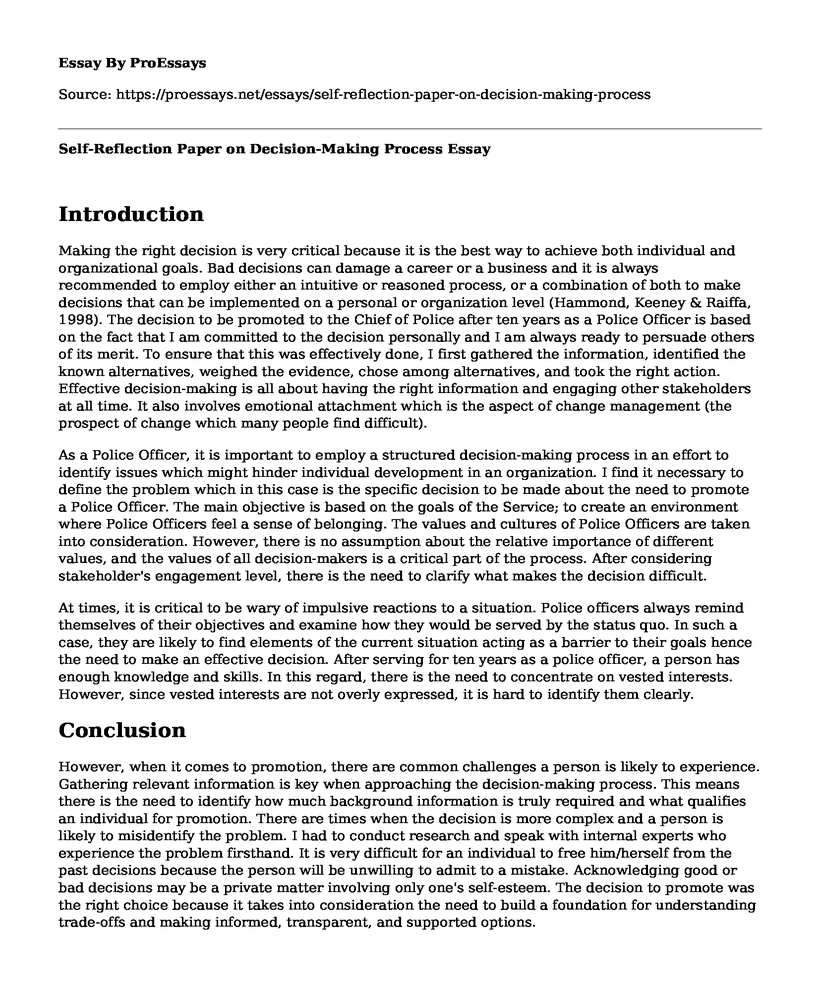Introduction
Making the right decision is very critical because it is the best way to achieve both individual and organizational goals. Bad decisions can damage a career or a business and it is always recommended to employ either an intuitive or reasoned process, or a combination of both to make decisions that can be implemented on a personal or organization level (Hammond, Keeney & Raiffa, 1998). The decision to be promoted to the Chief of Police after ten years as a Police Officer is based on the fact that I am committed to the decision personally and I am always ready to persuade others of its merit. To ensure that this was effectively done, I first gathered the information, identified the known alternatives, weighed the evidence, chose among alternatives, and took the right action. Effective decision-making is all about having the right information and engaging other stakeholders at all time. It also involves emotional attachment which is the aspect of change management (the prospect of change which many people find difficult).
As a Police Officer, it is important to employ a structured decision-making process in an effort to identify issues which might hinder individual development in an organization. I find it necessary to define the problem which in this case is the specific decision to be made about the need to promote a Police Officer. The main objective is based on the goals of the Service; to create an environment where Police Officers feel a sense of belonging. The values and cultures of Police Officers are taken into consideration. However, there is no assumption about the relative importance of different values, and the values of all decision-makers is a critical part of the process. After considering stakeholder's engagement level, there is the need to clarify what makes the decision difficult.
At times, it is critical to be wary of impulsive reactions to a situation. Police officers always remind themselves of their objectives and examine how they would be served by the status quo. In such a case, they are likely to find elements of the current situation acting as a barrier to their goals hence the need to make an effective decision. After serving for ten years as a police officer, a person has enough knowledge and skills. In this regard, there is the need to concentrate on vested interests. However, since vested interests are not overly expressed, it is hard to identify them clearly.
Conclusion
However, when it comes to promotion, there are common challenges a person is likely to experience. Gathering relevant information is key when approaching the decision-making process. This means there is the need to identify how much background information is truly required and what qualifies an individual for promotion. There are times when the decision is more complex and a person is likely to misidentify the problem. I had to conduct research and speak with internal experts who experience the problem firsthand. It is very difficult for an individual to free him/herself from the past decisions because the person will be unwilling to admit to a mistake. Acknowledging good or bad decisions may be a private matter involving only one's self-esteem. The decision to promote was the right choice because it takes into consideration the need to build a foundation for understanding trade-offs and making informed, transparent, and supported options.
References
Hammond, J. S., Keeney, R. L., & Raiffa, H. (1998). The Hidden Traps in Decision Making. Harvard Business Review, 76(5), 47-58.
Cite this page
Self-Reflection Paper on Decision-Making Process. (2022, Jul 01). Retrieved from https://proessays.net/essays/self-reflection-paper-on-decision-making-process
If you are the original author of this essay and no longer wish to have it published on the ProEssays website, please click below to request its removal:
- Ingredients of Effective Leadership Paper Example
- How I Will Acknowledge the Cultural Diversity in My Workplace - Essay Sample
- Essay on My Journey to Leadership: A Story of Success
- Essay Sample on Servant Leadership: Caring for People, Promoting Personal Development
- Essay on Org Success: Quality Goods & Services Central to Vision, Goals & Mission
- New Managers: Avoiding Common Mistakes in Leadership - Essay Sample
- Optimizing Projects: Establishing Necessary Methods & Processes - Essay Sample







